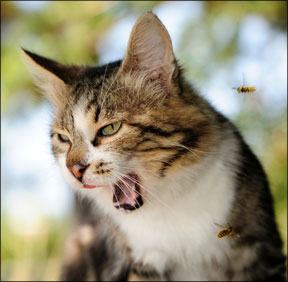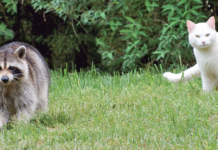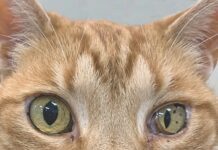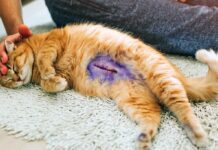The warmer weather brings sunshine, fresh breezes, singing birds – and bugs. As a conscientious pet owner, its likely that you wonder if its safe for your 288 cat to eat bugs. The answer depends on what kind of bug youre talking about. According to Steven Hansen, DVM, ASPCA Veterinary Toxicologist and Senior Vice President of Animal Health Services of the national ASPCA Animal Poison Control Center, “most calls involve animals eating things they shouldnt, including bugs.” Cats chase and eat bugs because they love to play with small moving objects. Most bugs are safe for your cat to sample. These include nonbiting ants and flies, most beetles, cockroaches, centipedes and moths and common household spiders. “Many people are worried about cats toying with or chewing on ant traps,” says Dr. Hansen. “This is usually not a problem because the concentration of insecticide in these traps is very low and should not affect your cat.” Beware of Bad Bugs. If at all possible, keep your cat away from stinging insects, such as yellow jackets, wasps and hornets. Most stinging insects will not go after cats unless they are provoked. But if you see your cat playing with a bee or other stinging insect inside your home, get her away from it and isolate her inside a closed room. Leave a window open for the insect to escape, or kill it with a fly swatter. “Bee stings are very painful and the toxins can cause very serious consequences for your cat,” says Dr. Hansen. The signs of a sting include acute swelling and redness around the cats nose or face. Your cat may yowl from pain, and he may rub his paws on his face. “Cats can even get hives during an allergic reaction,” says Dr. Hansen. “The fur will take on a cobblestone appearance because of the underlying bumps.” If you notice these signs, take your feline to the veterinarian immediately. A more serious situation can occur when a cat swallows a bee. The venom can cause the throat and airway to swell, jeopardizing your cats breathing. “If this happens, you may see your cat struggling to breathe, says Dr. Hansen. “Your cat may extend his neck and breathe with an open mouth, forcing air movement with his chest and abdominal muscles.” This is a true emergency. Take your cat immediately to an emergency veterinary hospital. Spiders generally wont harm your cat, but there are two spiders to avoid: the black widow spider and the brown recluse spider. (The ASPCA hotline is (888) 426-4435, and is staffed 24 hours a day.)




